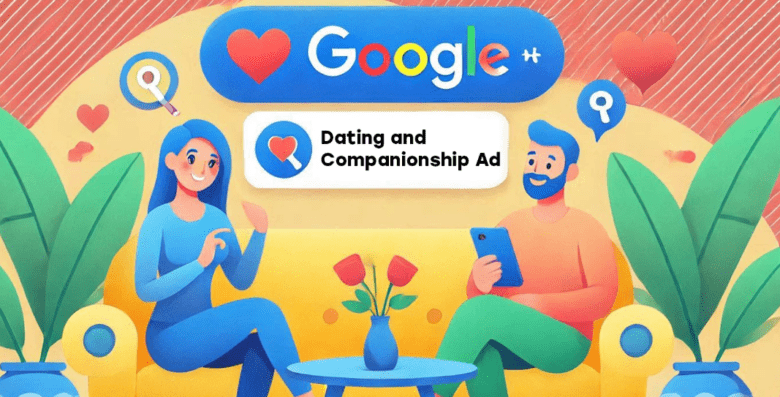Google Announces New Dating and Companionship Ads Policy: March 2025 Launch & Certification Program for Advertisers
Google is set to launch its new dating and companionship ads policy on March 4, 2025, introducing a transformative shift for advertisers in the dating and companionship industry. This companionship ad policy requires advertisers to follow stricter guidelines, obtain certification from Google, and ensure their ads align with local laws and user protection standards. With this new policy, advertisers must adapt to remain compliant while continuing to thrive in their PPC campaigns.
This guide dives into the key aspects of Google’s new dating and companionship ads policy, providing actionable insights to help advertisers comply with the new regulations, enhance user trust, and achieve SEO success.
What Is Google’s New Dating and Companionship Ads Policy?
Google’s companionship ads policy and advertiser certification framework are designed to create a safer advertising environment by reducing inappropriate content and eliminating deceptive or exploitative ads. The policy aims to address challenges within the dating or companionship market, such as ads with racy content, nudity, and misleading practices.
Key features of the new policy include:
- Mandatory Certification:Advertisers must complete the certification process to gain approval for running their ads.
- Restricted Ad Types:Ads promoting fetish dating, hook-ups, flings, or affair services will face strict limitations.
- Ad Content Regulations:Ads featuring inappropriate content and sexual content, such as racy content on the landing page, will not be permitted.
- User Protections:Factors like user age, SafeSearch settings, and local laws will influence ad restrictions.
By enforcing these changes, Google seeks to build trust among users and protect vulnerable audiences from misleading or harmful ads.
Why Is Google Launching This Policy in March 2025?
The launch of the new ‘dating and companionship’ ads policy reflects Google’s commitment to maintaining the integrity of its advertising platform. As advertisers must adhere to increasingly stringent regulations, Google is addressing significant issues in the dating or companionship sector, including:
- Inappropriate Ads:Many ads for sites with racy content or sexual fetish dating promote harmful stereotypes or exploit vulnerable users.
- Deceptive Practices:Ads that misrepresent services or target underage individuals erode trust in the industry.
- User Safety Concerns:Surveys reveal high levels of harassment and exploitation among users of dating platforms, necessitating more robust protections.
By introducing this update, Google not only enforces the content of our policies but also ensures alignment with global advertising standards.
Key Features of Google’s New Companionship Ad Policy
The new policy outlines strict requirements for advertisers in the dating and companionship industry.
Prohibited Types of Ads
Google will ban ads promoting:
- Fetish dating and affair services.
- Ads featuring nudity, suggestive imagery, or ads with racy content.
- Exploitative practices, such as mail-order spouses or underage dating.
Restricted Ad Categories
Certain ad types, such as hook-up sites or flings, may only be approved under specific conditions, considering factors like local laws and user’s SafeSearch settings.
All advertisers must complete Google’s certification program before launching campaigns. This involves a thorough review of ads and landing pages to ensure compliance with the new policy.
How Advertisers Can Align Their Campaigns With Google’s New Policy
To ensure compliance with the new dating and companionship ads regulations, advertisers should take the following steps:
-
Review Their Ads and Landing Pages
Conduct an audit of existing ads and landing pages to identify and remove inappropriate content or elements that violate Google’s guidelines. Pay close attention to content that may appear deceptive or exploitative. -
Complete the Certification Process
The certification process requires advertisers to submit their campaigns for approval. Start early to avoid disruptions, as Google will begin enforcing the policy on March 4, 2025. -
Optimize Ad Targeting
Tailor campaigns to align with permissible categories. Avoid using restricted terms like “fetish dating” or promoting ads featuring racy content.
By aligning their strategies with these guidelines, advertisers can continue to advertise effectively while staying compliant.
Timeline for the March 2025 Policy Implementation
Google’s companionship ads policy follows a phased rollout:
- Pre-March 4: Advertisers should focus on reviewing campaigns, completing certifications, and making necessary updates.
- March 4, 2025: The policy officially takes effect, with full enforcement ramping up in the following weeks.
Failing to comply with these timelines may result in blocked ads and loss of advertising opportunities.
Implications for the Dating and Companionship Industry
The new dating and companionship ads policy will bring significant changes to the industry:
-
Enhanced User Trust
By eliminating inappropriate ads, Google creates a safer advertising environment that builds credibility among users. -
Challenges for Advertisers
Dating app advertisers and others reliant on restricted categories, such as swinger sites or ads with nudity, may face challenges in adapting their campaigns.
Best Practices for SEO and Compliance
To maximize the success of campaigns under Google’s new policy, advertisers should:
- Use Targeted Keywords:Incorporate variations like new dating and companionship ads and the certification process naturally in the content.
- Optimize for Search Engines:Ensure landing pages are informative, compliant, and aligned with Google’s quality standards.
- Enhance User Experience:Create engaging, transparent ad copy that resonates with your audience while adhering to guidelines.
Conclusion: Preparing for Google’s New Policy
Google’s dating and companionship ads policy represents a significant shift in the dating or companionship sector. By completing the certification process, updating campaigns, and ensuring compliance with the new policy, advertisers can maintain their visibility on Google Ads while contributing to a more ethical advertising landscape.



